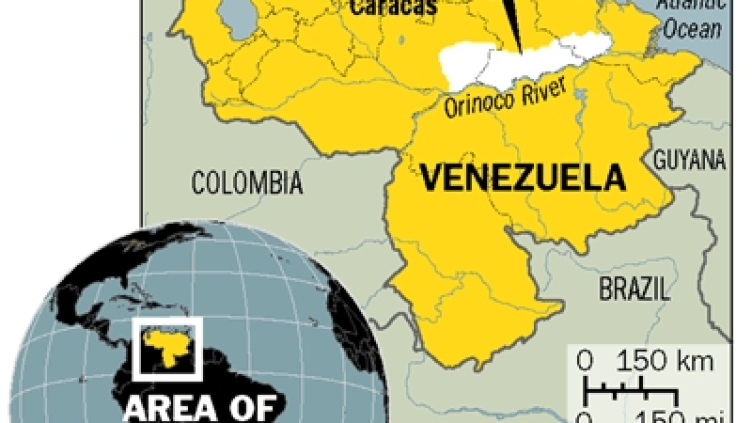Project – On record
This profile is no longer actively maintained, with the information now possibly out of dateBankTrack

Project – On record
This profile is no longer actively maintained, with the information now possibly out of dateBankTrack
What must happen
Private banks must not participate to the funding of these projects, whatever forms it takes, be it project finance, general corporate loans or underwriting of shares or bonds on the stock markets of the companies involved.
| Sectors | Oil and Gas Extraction |
| Location |
|
Venezuela's tar sands are reported to be the largest after Canada, with recoverable oil totalling at least 2.26 trillion barrels. The majority of the deposits are located in the Orinoco river basin. The Venezuelan government estimates that 20% of the Orinoco basin deposits are extractable using current technology, or around 316 billion barrels. Venezuela is already producing more than half a million barrels of oil per day from four existing tar sands developments: Petroanzoategui, Petromonagas, Petrocedeno and Petropiar.
About 8-12% of the Orinoco oil is recoverable through mining extraction techniques. The rest of the oil will then be extracted through steam-based in situ production, and potentially "methods involving gas injection and in situ combustion".
The Orinoco basin has been divided into four areas for the purposes of tar sands exploration and development. From west to east, these are called Boyaca, Junin, Ayacucho and Carabobo.
Social and human rights impacts
The social impact of oil exploitation in Venezuela can be argued to have had both positive and negative aspects since the Chavez government came to power. On the positive side, the state-owned Petroleos de Venezuela (PDVSA), which holds a majority stake in all oil projects in the country, must spend at least 10% of its annual investment budget on social programmes. Some of this money was intended to be spent on free health care, discounted food for poor neighbourhoods, job creation programmes, education, indigenous land-titling, and discounted oil prices for exports to neighbouring Caribbean countries and some areas of the US.
On the other hand, almost half of PDVSA's staff went on strike in 2002 in protest at a new Chavez-appointed board of directors. Following this, 18,000 workers were fired and the International Labour Organisation called for an independent investigation into allegations by the workers of detention and torture. Chavez has now strengthened the links between PDVSA and his executive, with the current PDVSA President Rafael Ramirez - who is also the Minister for Petroleum - telling managers that PDVSA is "red from top to bottom [....] Those who do not feel comfortable [supporting Chavez] should give their jobs to a Bolivarian".
Tar sands impact the health and human rights of people at various stages of the life of a project. As stated above, the production of the tar sands contaminates surrounding water causing direct health impacts. Infact many of the toxins which leak into the water have been linked to elevated rates of cancer in downstream communities. Exploiting tar sands involves widespread deforestation and wildlife loss leaving devastating implications for the surrounding communities.
Environmental and climate impacts
The clearest and most obvious concern of this project is the fact that the tar sands are one of the key contributors to climate change. This is mostly attributed to the size of tar sands deposits and their unusually high greenhouse gas emissions. It is the process of converting the sands to oil that is one of the key concerns as about three barrels of natural gas are used to create one barrel of tar sands oil.
Apart from the potential recurrence of the local environmental damage associated with tar sands production, is the size of the deposits being explored, which will mean the release of huge amounts of GHG into the atmosphere.
At the same time, the localized environmental impacts are also of concern. There are various local environmental effects: from forest destruction, loss of wildlife, water contamination and more. In order to develop the tar sands forests are usually clear cut, leaving habitats destroyed, wild life lost, and even the carbon capture from the forest is also affected. During tar sands production contaminated water may also leak to the rivers, containing arsenic, mercury, and various carcinogens, all of these are known to cause cancer and kill local wild life.
Indian Oil Corporation
IndiaNKK
Russian FederationOil and Natural Gas Corporation
IndiaOil India Limited
IndiaPDVSA
VenezuelaPetronas
MalaysiaRepsol
Spain2011
2011-05-09 00:00:00 | Latest update
The Petrocedeno block is being operated by Total (30.3%) and Statoil (9.7%). The block produces about 170,000 barrels of upgraded oil per day, as well as 6,000 tonnes of coke and 900 tonnes of sulphur daily. Total was also compensated for more than $1 billion by the Venezuelan government for the partnationalisation of their share in the project. Total and Statoil initially stepped into the gap left by withdrawal of ConocoPhillips in 2006, signing a joint agreement with PDVSA for evaluation of the Petroanzoategui block. Although Total claimed that this agreement "demonstrate[d] the commitment of Total and PDVSA to maintaining their cooperation over the long term", in January 2010 the Ministry of Oil announced that the "Proposals submitted [...] did not meet the requirements", and that consequently PDVSA would be developing the block, which could contain 29 billion barrels of recoverable oil, alone.
